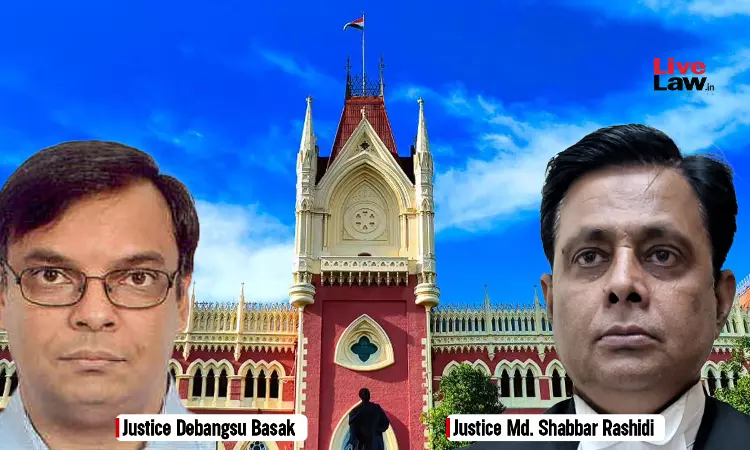- Home
- /
- High Courts
- /
- Calcutta High Court
- /
- 'Society Needs To Be Protected':...
'Society Needs To Be Protected': Calcutta High Court Imposes 40 Year Sentence On "Gurudev" Convicted Of Murder, Commutes Death Penalty
Srinjoy Das
19 Sept 2025 10:30 AM IST
The Calcutta High Court has commuted the death sentence imposed on an alleged 'Gurudev' for the murder of two women over alleged monetary disputes, after the appellant-Gurudev and his wife had promised certain cures to the deceased and their family, in exchange for large sums of money.A division bench of Justices Debangu Basak and Md Shabbar Rashidi held:"Therefore, taking into consideration...
The Calcutta High Court has commuted the death sentence imposed on an alleged 'Gurudev' for the murder of two women over alleged monetary disputes, after the appellant-Gurudev and his wife had promised certain cures to the deceased and their family, in exchange for large sums of money.
A division bench of Justices Debangu Basak and Md Shabbar Rashidi held:
"Therefore, taking into consideration the entire facts and circumstances of the case discussed hereinbefore and in consideration of the guidelines laid down by the Hon'ble Supreme Court in its various pronouncements, we are minded to commute the death sentence awarded to the appellant for the offence punishable under Section 302 of the Indian Penal Code, 1860, into one of life imprisonment."
"However, considering the age of the appellant as well as the nature of offence and the fact that there were similar allegations against the appellant of habitually engaging in extracting money from unsuspecting members of society on the plea of curing diseases or bestowing corporeal and incorporeal benefits as Gurubaba, the society at large requires to be protected from the appellant for a considerable length of time. For such reason, the imprisonment of life so awarded to the appellant shall mean imprisonment for life without remission until 40 years from the date of his arrest," it added.
Background
According to the case of the prosecution, the two victims were found dead in their house in suspicious circumstances. Evidence at the trial showed that the victims were murdered by smothering and gagging.
Considering the circumstances under which the dead bodies were recovered, the physical condition of the dead bodies, the nature of injuries thereon, presence of gagging materials, the hands and legs being found in tied condition and also taking into account the opinion of the autopsy surgeon as to the cause of death of the victims, the court found no doubts in concluding that the two victims were murdered.
The prosecution stated that the appellant took money for curing one of the victims in the name of performing Joggo. However, when he failed to keep his commitment, the money was allegedly demanded back, and in order to terrorise the victims and to avoid the return of such money, the appellant committed murder of the two victims.
It was alleged that he came to the house of the victims in the name of performing Joggo in their house, stayed the night, made them prepare cashew nut paste, mixed some medicine in it and gave it to the victims to consume in the name of a sacred offering (Prasad). After taking the 'prasad', the victims went unconscious. Then the appellant killed the victim F1 by smothering while she was unconscious, and thereafter, the appellant killed F2 also by throttling.
The husband of victim F1 and Father of F2, PW15 had stated that he came in contact with the appellant on a train in the course of treatment of his daughter, who sustained burn injuries. The appellant assured him of curing his daughter and took him to a doctor at Sainthia. After 2/4 months, the appellant told PW15 that one Gurubaba can cure his daughter.
Thereafter, the appellant started visiting the house of PW15 often for the purpose of performing puja and Joggo to cure his daughter and demanded a sum of ₹1,61,000/- for performing 'Joggo' and medicines to cure his daughter, out of which ₹83,000/- or ₹84,000/- was already paid to him.
Court noted that from the evidence of the aforesaid witnesses, especially PW15, it was evident that the appellant took a huge amount of money for curing burn injuries of F2 by performing 'Home and Joggo'. However, when he failed to cure, the money was demanded back. He threatened the victim as well as PW15.
Court noted evidence that showed that the appellant went to the house of PW15 to perform Joggo and administered 'Prasad' mixed with sedatives, as the unused strips of such sedative medicines, 'Cetirizine' and 'Alzolam' were recovered following the leading statement of the appellant.
Therefore, in view of the evidence discussed above, the court found no reason to interfere with the impugned judgment and order for the conviction of the appellant for the offence punishable under Section 302/201 of the Indian Penal Code.
However, in finding no evidence for the same, the court set aside the charges on sexual assault under Section 376 of the IPC.
Accordingly, it commuted the death sentence of the appellant and imposed a sentence of imprisonment for life, without remission for 40 years.
Case: THE STATE OF WEST BENGAL v SUNIL DAS@ HARI CHARAN DAS @ HARI BABA @ SWARUP ROY @ GURUDEV
Case No: CRIMINAL APPEAL (DB) NO. 191 OF 2024



